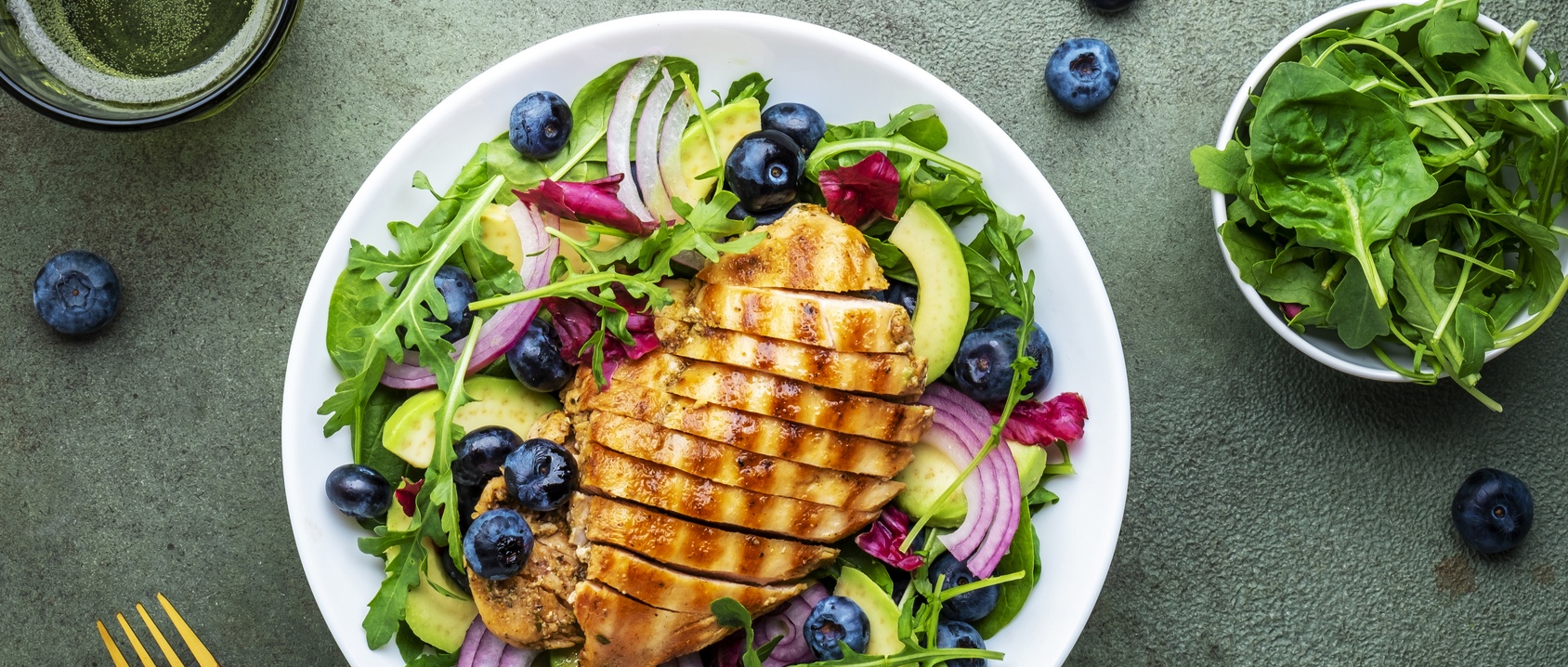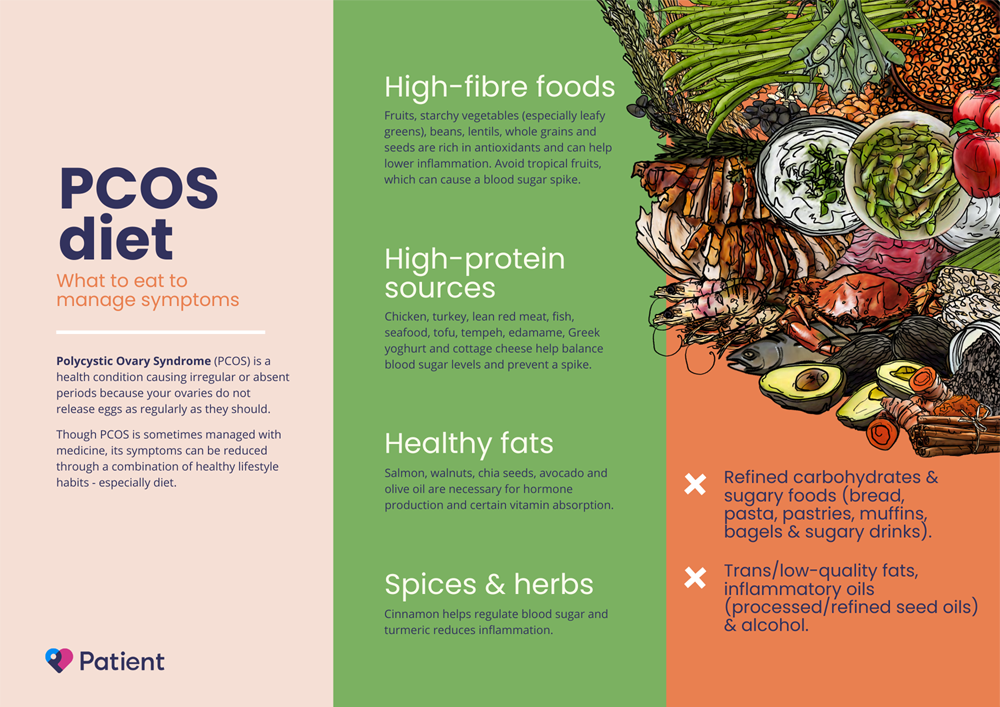
PCOS diet: What to eat to manage symptoms
Peer reviewed by Dr Krishna Vakharia, MRCGPAuthored by Victoria RawOriginally published 20 Jan 2025
Meets Patient’s editorial guidelines
- DownloadDownload
- Share
- Language
- Discussion
Polycystic Ovary Syndrome (PCOS) is a health condition that affects some women from their late teens onwards. Though PCOS is sometimes managed with medicine, its symptoms can be reduced through a combination of healthy lifestyle habits - especially your diet.
In this article:
Video picks for PCOS
Continue reading below
What is PCOS?
PCOS is a hormonal disorder that affects 1 in 10 women worldwide. If you have PCOS, you may have irregular or absent periods. This is because your ovaries do not release eggs as regularly as they should.
Dr Megan Lyons, Double Board Certified Doctor of Clinical Nutrition, The Lyon's Share, Dallas, USA explains that one of the hallmark symptoms of PCOS is the presence of multiple ovarian cysts, which gives the condition its name.
However, they are not actually cysts. They're painless, fluid-filled sacs (follicles) surrounding your ovaries that cause them to become enlarged. The abnormal hormone levels in PCOS can prevent some of the follicles from growing and maturing to release eggs. This contributes to irregular menstrual cycles and some cycles where eggs aren't released at all (anovulation).
Lyons says: "People with PCOS also have high levels of androgens. These are traditionally thought of as male hormones, but are present in both men and women at different levels. In women with PCOS, these androgens are higher than normal."
Alyssa Pacheco, Registered Dietitian, The PCOS Nutritionist Alyssa, Greater Boston, USA says that PCOS can present differently and cause a variety of symptoms.
Not everyone with polycystic ovaries will have PCOS and not everyone with PCOS has polycystic ovaries.
For diagnosis, you need any two of the following:
Polycystic ovaries - usually seen on an ultrasound scan. An ovary might have more than 20 cysts.
Signs of high androgen levels - for example high testosterone levels from blood tests or symptoms of high testosterone such as hirsutism or acne.
No or infrequent periods.
Aside from irregularities in your period, these can also include:
Hair thinning or hair loss.
Acne.
Fatigue.
Weight gain - particularly around the tummy (abdomen).
Abnormal hair growth (hirsutism) - typically in areas such as your face, bottom, back, or chest.
Lyons adds: "It can also lead to irritability, mood changes, and depression."
Pacheco says that PCOS is linked to an increased chance of developing type 2 diabetes, heart disease, fatty liver, and endometrial cancer.
How can diet help with PCOS?
Back to contentsPCOS diet: what to eat to manage symptoms

Graphic: Ben Hudson
Up to 70% of women with PCOS have insulin resistance. Insulin is a hormone your body makes to stabilise your blood sugar levels.
Lyons says that though PCOS is often categorised as a hormonal disorder, it is increasingly considered a metabolic condition because much can be done to manage it through food and lifestyle changes. One of the most effective strategies for managing PCOS is blood sugar stabilisation.
"By controlling blood sugar, we can help reduce insulin resistance," Lyon explains. "This, in turn, supports proper metabolic function and contributes to hormone balance."
Pacheco explains that PCOS is also linked with long-term inflammation.
"Insulin resistance and inflammation can each increase androgens - such as testosterone levels - which cause a lot of the typical PCOS symptoms," she says. "By including certain foods, in specific patterns, that maintain stable blood sugar levels and lower inflammation, you can see a decrease in PCOS symptoms."
Continue reading below
Foods to eat with PCOS
Back to contentsTo help stabilise blood sugar levels, it's important to focus on the types of foods that support blood sugar regulation and lower inflammation.
Lyons says that when the body is not constantly fighting inflammation, it has more resources available to regulate hormones effectively.
Both Lyons and Pacheco recommend the following foods to help ease PCOS symptoms.
High-fibre foods - such as fruits, starchy vegetables (especially leafy greens), beans, lentils, whole grains and seeds. These are rich in antioxidants and can help lower inflammation. However, avoid tropical fruits, which can cause a blood sugar spike.
High-protein sources - such as chicken, turkey, lean red meat, fish, seafood, tofu, tempeh, edamame, Greek yoghurt and cottage cheese. These foods can help balance your blood sugar levels and prevent a spike.
Healthy fats - such as salmon, walnuts, chia seeds, avocado and olive oil. These are necessary for hormone production, and certain vitamin absorption.
Spices and herbs - such as cinnamon (which could help regulate blood sugar) and turmeric (which could reduce inflammation).
Pacheco recommends pairing high-fibre carbohydrates with protein and healthy fats at meals for an optimal combination to keep blood sugar levels more stable.
Foods to avoid with PCOS
Back to contentsWhen modifying your diet to help manage PCOS symptoms, it's important to minimise foods that cause blood sugar spikes.
Lyons says these include refined carbohydrates and sugary foods such as bread, pasta, pastries, muffins, bagels and sugary drinks. She also recommends cutting back on trans fats, low-quality fats, inflammatory oils - such as processed and refined seed oils - and alcohol.
Pacheco agrees that these types of foods can worsen inflammation or insulin resistance if they're consumed frequently, or in high amounts.
Continue reading below
What else can help with symptoms of PCOS?
Back to contentsAccording to Pacheco, while diet can certainly help PCOS symptoms, it's not the only thing you can focus on.
"Exercise, getting enough sleep, and stress management are all big factors when it comes to hormone health," she says.
Make time for exercise
Physical activity plays a crucial role in managing PCOS. A balanced exercise routine - incorporating strength training and moderate cardio - can significantly improve PCOS symptoms.
Lyons advises that while people with PCOS shouldn't overexert themselves with intense activities like running marathons, a moderate amount of low-intensity cardio can also be beneficial.
She adds: "Strength training also helps with blood sugar regulation, reduces insulin resistance, and decreases inflammation."
Sleep well, stress less
In addition to exercise, sleep is another key element of PCOS symptom control.
"Lack of sleep can make insulin resistance worse. Likewise, long term stress should be managed, as it can lead to cortisol dysregulation," says Lyons. "Cortisol is a hormone that affects both blood sugar and insulin levels - as well as androgens. So when cortisol levels are out of balance, it can make PCOS symptoms worse."
Supplements
Current UK guidance from the British Dietetic Association (BDA) advises that no supplements are necessary - or have a good evidence base - for their use in managing PCOS.
Effectively managing PCOS symptoms involves an integrated approach involving healthy dietary choices, regular exercise, quality sleep and stress management.
Lyon concludes: "By stabilising blood sugar and reducing insulin resistance, you can address the root causes of many PCOS symptoms. This can lead to improved hormone balance and overall wellbeing."
PCOS diet: what to eat to manage symptoms
Patient picks for PCOS

Hormones
Video: How much does PCOS affect fertility?
With PCOS leading to so many subsequent problems, it's no wonder that many women have a lot of questions about the condition. Our experts have the answers to some of them.
by Amberley Davis

Hormones
What's the link between PCOS and diabetes?
Polycystic ovary syndrome (PCOS) is an incurable endocrine condition affecting up to one in ten women in the UK. It's most commonly associated with hormonal symptoms, such as acne, excess hair growth, weight gain, irregular periods, and reduced fertility. However, it is also associated with seemingly unrelated long-term health risks, like type 2 diabetes and cardiovascular disease. In fact, women with PCOS are as much as 40% more likely to develop type 2 diabetes than women without the condition - so what exactly is the link between PCOS and diabetes?
by Sarah Graham
Continue reading below
Article history
The information on this page is peer reviewed by qualified clinicians.
Next review due: 20 Jan 2028
20 Jan 2025 | Originally published
Authored by:
Victoria RawPeer reviewed by
Dr Krishna Vakharia, MRCGP

Ask, share, connect.
Browse discussions, ask questions, and share experiences across hundreds of health topics.

Feeling unwell?
Assess your symptoms online for free
Sign up to the Patient newsletter
Your weekly dose of clear, trustworthy health advice - written to help you feel informed, confident and in control.
By subscribing you accept our Privacy Policy. You can unsubscribe at any time. We never sell your data.